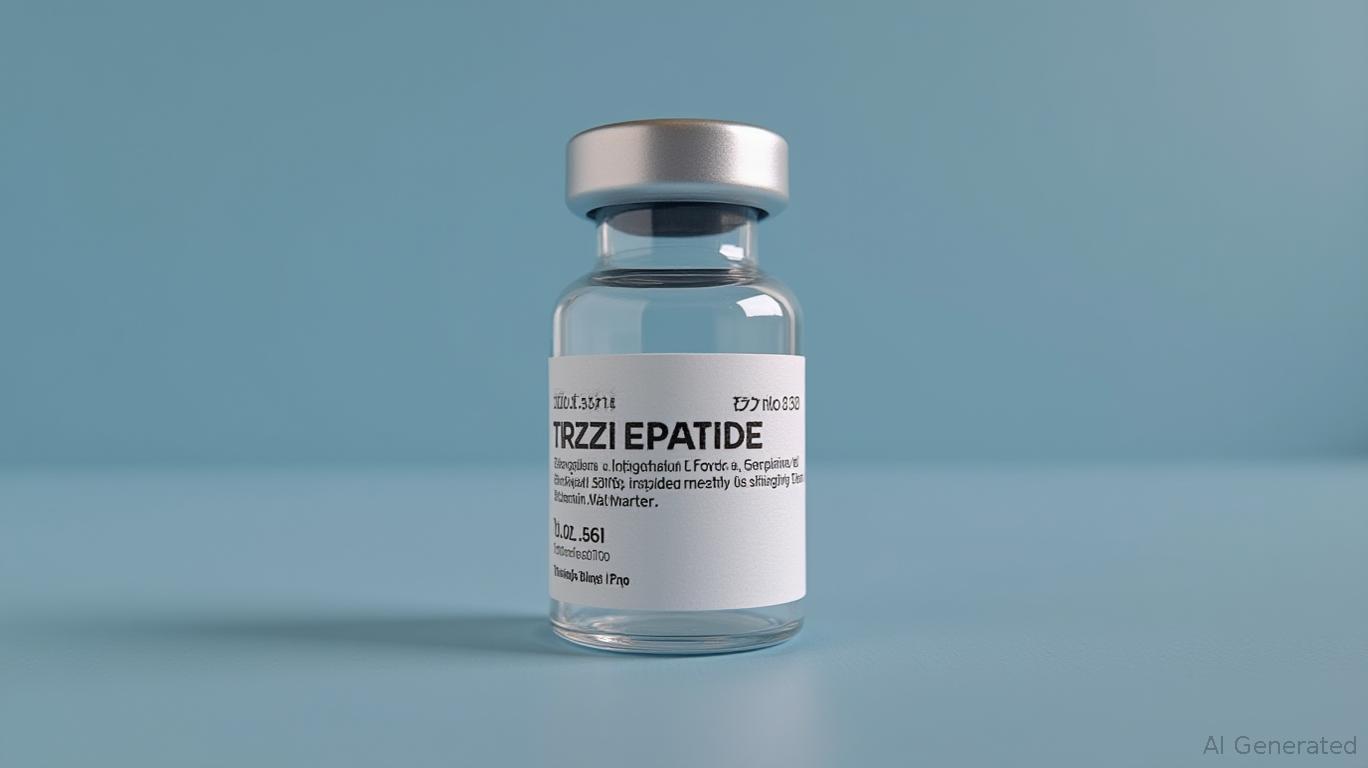Walmart and Lilly's Price Reduction Initiative Revolutionizes Access to Obesity Medications
- U.S. adult obesity rates declining drive demand for GLP-1 weight-loss drugs like Eli Lilly's Zepbound and Novo Nordisk's Wegovy. - Lilly-Walmart partnership slashes Zepbound prices by 50%+ via retail pharmacies, expanding access through direct-to-consumer model. - GLP-1 market surges 160% yearly in 2023-2024, projected to exceed $299B globally by 2033 due to dual diabetes-weight management efficacy. - Trump administration's price-cutting policies and retail partnerships reshape access, but high out-of-po
Obesity rates among adults in the United States have declined from previous highs, leading to increased interest in weight-loss medications and driving significant growth in the pharmaceutical sector. Major pharmaceutical companies, including
In October 2025, Eli Lilly and Walmart revealed that individuals with prescriptions could obtain single-dose Zepbound vials at discounts of 50% or more off the standard price through Walmart’s 4,600 pharmacies or via home delivery beginning mid-November. This partnership marks the debut of LillyDirect, Eli Lilly’s direct-to-consumer service, within a retail pharmacy network. The initiative is designed to make Zepbound more accessible, intensifying the competition between Eli Lilly and its main rival, Novo Nordisk, in the GLP-1 market, according to CNBC.

This alliance supports the Trump administration’s broader push to lower medication costs by encouraging direct-to-consumer approaches that bypass insurance intermediaries. With this model, patients pay a set fee—$349 monthly for the initial dose and $499 for higher doses—regardless of whether they choose home delivery or pick up in-store. Jennifer Mazur, who leads LillyDirect, highlighted that this program helps overcome obstacles to managing chronic illnesses, stating, "Addressing obesity comes with significant physical, emotional, and financial challenges. Our partnership with Walmart helps ease these challenges by simplifying access to prescribed therapies," as mentioned in a
Expanding Zepbound’s reach is a key part of Eli Lilly’s plan to lead the GLP-1 market. Direct-to-consumer purchases now represent over one-third of new Zepbound prescriptions, a milestone achieved after the introduction of cash discounts in August 2024. Meanwhile, Novo Nordisk is working with CVS and Caremark to distribute its rival drug, Wegovy. As the fifth-largest pharmacy chain in the country by prescription volume, Walmart plays a pivotal role in determining how patients access these treatments, CNBC reported.
The rapid expansion of the GLP-1 market is evident in industry statistics. Prescriptions for GLP-1 analogues in the U.S. jumped 160% from 2023 to 2024, and the global market is expected to surpass $299 billion by 2033, according to a
However, there are still hurdles to overcome. Eli Lilly’s direct-to-consumer approach has not fully resolved insurance coverage gaps, and the high costs for larger doses may still be a barrier for some. Additionally, the Trump administration’s "most favored nation" policy—which would tie U.S. drug prices to those in other countries—has yet to secure pricing deals with Eli Lilly, unlike agreements already made with Pfizer and AstraZeneca, CNBC stated.
Looking forward, the rivalry between Eli Lilly and Novo Nordisk is set to escalate. Novo Nordisk recently committed $4.1 billion to boost Wegovy’s global supply, while Eli Lilly is moving its triple-hormone agonist, "Retatrutide," into clinical testing, according to the PR Newswire release. The industry is also turning its attention to combination treatments and advanced delivery methods, with companies like Sanofi and AstraZeneca developing dual GLP-1/GIP analogues for metabolic conditions.
As the obesity epidemic continues to change, so does the pharmaceutical industry. The intersection of retail partnerships, regulatory changes, and ongoing innovation is transforming how patients receive vital treatments—and how industry leaders capture billions in revenue.
Disclaimer: The content of this article solely reflects the author's opinion and does not represent the platform in any capacity. This article is not intended to serve as a reference for making investment decisions.
You may also like
Ethereum News Update: Institutions Move Treasury Assets to Ethereum Amid Declining Bitcoin Dominance
- BitMine Immersion Technologies (BMNR) purchased 44,036 ETH ($166M) during a market dip, now holding 2.8% of circulating ETH as the second-largest digital asset treasury. - Institutional demand is shifting from Bitcoin to Ethereum, with Ethereum ETFs surpassing Bitcoin's in quarterly inflows for the first time in 2025. - Market reactions show divergence: Q3 ETF inflows reached $9.6B, but October saw $555M in outflows, highlighting contrasting institutional and retail behaviors. - Ethereum's price remains
Blockchain-based prediction markets face legal challenges as Romania prohibits Polymarket due to gambling regulations
- Romania banned blockchain prediction market Polymarket for operating without a license, citing gambling law violations. - The move joins crackdowns in Belgium, France, and Poland, as regulators classify such platforms as unregulated gambling. - Polymarket faces U.S. relaunch challenges despite acquiring a CFTC-registered exchange, amid fragmented state regulations and prior $1.4M fines. - Its blockchain-first model aims to differentiate from competitors but struggles against strict European gambling cont
Breaking: Crypto Market Maintains Downward Trend this October 31st
Follow Our Real-Time Updates as Cryptocurrency Values Keep Falling This Halloween

Bitcoin News Update: Galaxy Enhances Staking Platform as Institutions Turn to Bitcoin During Altcoin Market Volatility
- Galaxy Digital expands staking infrastructure with Coinbase Prime, its fourth custodial partner in 2025, aiming to lead institutional crypto solutions. - Jump Crypto's $205M Solana-to-Bitcoin swap via Galaxy highlights institutions shifting to Bitcoin amid altcoin volatility and ETF underperformance. - Galaxy's $443M staked assets and Texas data center expansion reflect growing institutional demand for crypto custody amid regulatory and liquidity challenges.
